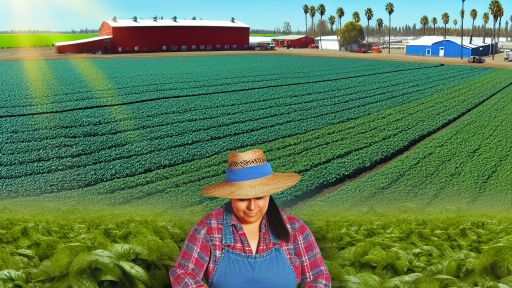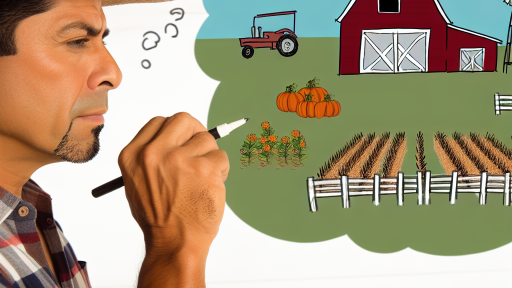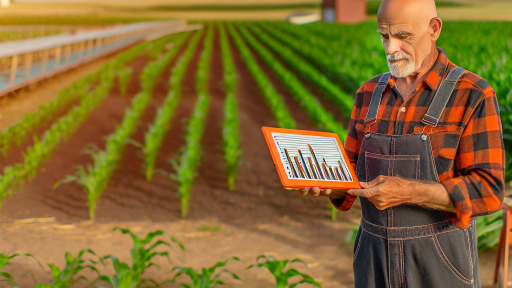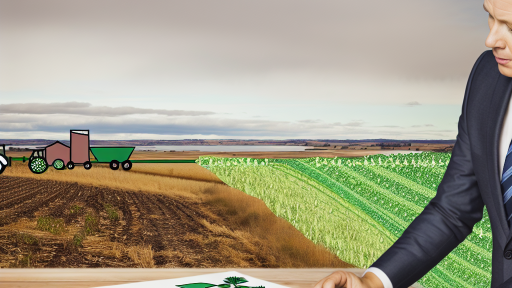Understanding the Concept of Agritourism and Its Benefits
Defining Agritourism
Agritourism combines agriculture and tourism into a unique experience.
It allows visitors to engage with agricultural activities directly.
Farmers host activities that provide educational and recreational benefits.
The Benefits of Agritourism
Agritourism generates additional income for farmers.
It diversifies revenue sources beyond traditional farming.
Moreover, it helps rural economies by attracting visitors.
Enhancing Visitor Experience
Visitors enjoy hands-on experiences, such as picking fruits.
Agritourism also promotes local produce through farm stands.
Additionally, it offers educational workshops on sustainable practices.
Fostering Community Connections
This practice strengthens ties between farmers and consumers.
It encourages awareness of agriculture in local communities.
Visitors often build a deeper appreciation for food sources.
Environmental Benefits
Agritourism promotes sustainable farming methods.
It emphasizes conservation through responsible land use.
Furthermore, it encourages biodiversity on farms.
Transform Your Agribusiness
Unlock your farm's potential with expert advice tailored to your needs. Get actionable steps that drive real results.
Get StartedIdentifying Sustainable Practices in Agriculture
Understanding Sustainable Agriculture
Sustainable agriculture promotes ecological balance and minimizes environmental impact.
It focuses on maintaining soil health and biodiversity.
This approach also ensures the efficient use of resources.
Methods of Sustainable Agriculture
Farmers can adopt various methods to promote sustainability.
Crop rotation enhances soil fertility and reduces pests.
No-till farming helps in soil conservation and reduces erosion.
Cover cropping improves soil health and prevents weed growth.
Integrated pest management minimizes the use of harmful chemicals.
Benefits of Sustainable Practices
Sustainable practices lead to healthier ecosystems.
They also improve the resilience of farms against climate change.
Importantly, they enhance food security for communities.
Moreover, sustainable farming promotes a better quality of life.
Examples of Sustainable Practices in Agritourism
Agritourism can integrate sustainable practices effectively.
Farmers can offer educational tours to teach visitors about sustainability.
Farm stands can sell locally sourced organic products.
Implementing renewable energy sources enhances sustainability.
Additionally, engaging in community-supported agriculture builds local connections.
Integrating Renewable Energy Solutions into Agritourism Operations
Understanding Renewable Energy
Renewable energy sources include wind, solar, and biomass.
These resources provide sustainable alternatives to fossil fuels.
Moreover, they reduce the carbon footprint of agritourism operations.
Understanding how each source works is crucial for implementation.
Benefits of Renewable Energy in Agritourism
Adopting renewable energy enhances sustainability practices.
This approach attracts eco-conscious visitors to agritourism sites.
Additionally, it lowers energy costs over time.
Showcase Your Farming Business
Publish your professional farming services profile on our blog for a one-time fee of $200 and reach a dedicated audience of farmers and agribusiness owners.
Publish Your ProfileFurthermore, renewable energy sources are often eligible for government incentives.
Implementing Solar Energy Solutions
Solar panels are an effective way to harness the sun’s energy.
They can power various facilities on agritourism farms.
Consider installing panels on rooftops or unused land.
Moreover, offer guided tours to educate visitors about solar energy.
Utilizing Wind Energy
Wind turbines generate electricity through wind movement.
Small-scale turbines work well on many agritourism properties.
They can supplement energy needs while demonstrating clean energy use.
Wind energy can complement other renewable sources effectively.
Investing in Biomass Energy
Biomass energy utilizes organic materials for fuel.
Farm waste like crop residues becomes a valuable resource.
This process not only reduces waste but also generates energy.
Furthermore, it engages guests with hands-on experiences.
Creating an Energy Management Plan
Develop an energy management plan that outlines goals and strategies.
Involve staff in identifying energy consumption patterns.
Monitor energy usage regularly to identify improvement areas.
Moreover, communicate your sustainability objectives with guests.
Collaborating with Experts
Partnering with renewable energy professionals can streamline implementation.
They provide valuable insights on the best technologies for your needs.
Consider collaborating with local sustainability organizations.
Workshops and resources can further educate your team and guests.
Encouraging Visitor Participation
Invite visitors to engage in renewable energy initiatives.
Offer workshops on DIY solar projects or energy conservation tips.
Additionally, promote community events centered around sustainability.
This involvement creates a memorable experience for guests.
Explore Further: Sustainable Supply Chain Strategies for Modern Farmers
Promoting Biodiversity through Sustainable Land Management
Understanding Biodiversity
Biodiversity refers to the variety of life on Earth.
It includes different species, ecosystems, and genetic variations.
High biodiversity contributes to ecosystem stability and resilience.
The Role of Sustainable Land Management
Sustainable land management practices enhance biodiversity.
These practices minimize negative environmental impacts.
Additionally, they restore ecosystems and habitats.
Implementing Sustainable Practices
Farmers can adopt several sustainable practices.
- Crop rotation boosts soil health.
- Cover cropping prevents soil erosion.
- Agroforestry integrates trees into farming systems.
Such practices support diverse plant and animal life.
Collaborative Efforts for Biodiversity
Local communities should cooperate with farmers.
Partnerships can promote biodiversity initiatives.
Moreover, educational programs raise awareness about sustainable practices.
Monitoring and Evaluation
Regular monitoring is crucial for sustainable land management.
Data helps assess the impact on biodiversity.
Adaptive management ensures continuous improvement.
Showcase Your Farming Business
Publish your professional farming services profile on our blog for a one-time fee of $200 and reach a dedicated audience of farmers and agribusiness owners.
Publish Your ProfileAs a result, stakeholders can adjust practices as needed.
Find Out More: Protect Your Farm: Top Risk Management Tips
Implementing Water Conservation Techniques on the Farm
Assessing Water Needs
Evaluate current water usage thoroughly.
This assessment helps identify areas for improvement.
Farmers can analyze irrigation patterns and crop needs.
Using smart sensors can provide real-time data.
Additionally, consider seasonal changes in water availability.
Choosing Efficient Irrigation Systems
Select irrigation methods that conserve water effectively.
Drip irrigation systems minimize water waste significantly.
Also, subsurface irrigation can be highly efficient.
Regularly inspect irrigation infrastructure to ensure functionality.
Finally, invest in automated irrigation controllers.
Implementing Rainwater Harvesting
Install rainwater collection systems across the farm.
This method reduces dependency on municipal water supplies.
Use collected rainwater for irrigation and livestock.
Ensure storage tanks are clean and well-maintained.
Moreover, promote awareness of rainwater benefits among staff.
Practicing Soil Moisture Management
Employ soil moisture sensors to enhance irrigation scheduling.
This practice can prevent overwatering and save resources.
Cover crops and mulching help retain soil moisture effectively.
Furthermore, add organic matter to improve soil health.
Educating Employees and Visitors
Train staff on the importance of water conservation.
Foster a culture of sustainability among employees.
Engage visitors through informational signage and workshops.
Create experiences that showcase conservation techniques.
Encourage guests to adopt similar practices at home.
Find Out More: Sustainable Livestock Farming Practices for Environmental Stewardship
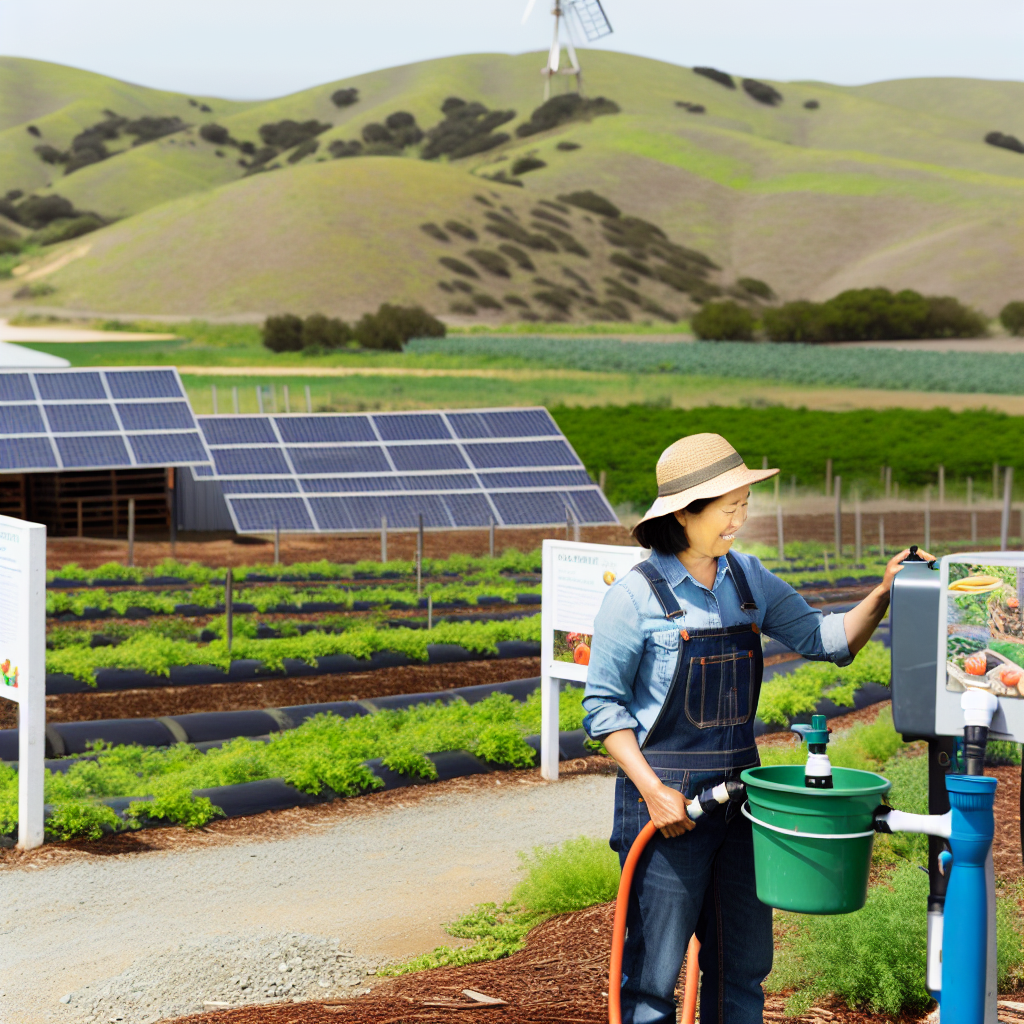
Creating Local Partnerships to Support Sustainable Tourism
Importance of Collaboration
Collaboration enhances the effectiveness of sustainable tourism initiatives.
Local partnerships leverage diverse resources and knowledge.
They also foster community engagement and support.
Identifying Key Stakeholders
Successful partnerships start with identifying key stakeholders.
Farmers, local businesses, and conservation groups play crucial roles.
Additionally, tourism boards can provide valuable insights and resources.
Connecting with educational institutions is also beneficial.
Building Relationships
Building relationships requires open communication and trust.
Organize community meetings to share ideas and concerns.
Regular updates help maintain trust and collaboration.
Consider joint projects as opportunities for growth.
Shared Goals and Vision
Establishing shared goals is vital for a successful partnership.
Clearly articulate the vision for sustainable tourism.
Showcase Your Farming Business
Publish your professional farming services profile on our blog for a one-time fee of $200 and reach a dedicated audience of farmers and agribusiness owners.
Publish Your ProfileThis clarity aligns efforts and strengthens commitment.
Regularly review and adapt goals as needed.
Marketing Collaborative Efforts
Promoting local partnerships attracts more visitors.
Highlight unique offerings to differentiate from competitors.
Utilize social media and local events to spread the word.
Engaging storytelling can effectively showcase benefits.
Measuring Impact
Assessing the impact of partnerships is essential.
Collect data on visitor satisfaction and community feedback.
Analyze economic benefits to local stakeholders.
Use results to refine strategies and enhance sustainability.
You Might Also Like: Comprehensive Tax Planning Strategies For Farmers And Agribusinesses
Marketing Sustainable Agritourism
Understanding the Target Audience
Identify the demographics interested in sustainable agritourism.
Consider factors such as age, lifestyle, and values.
Understanding the audience helps tailor marketing strategies effectively.
Utilizing Digital Marketing Tools
Implement social media platforms to promote your agritourism venture.
Engage with followers through captivating posts and stories.
Use engaging visuals to showcase sustainable practices.
Additionally, optimize your website for search engines.
High-quality content will attract visitors to your site.
Creating Partnerships and Collaborations
Develop partnerships with local businesses and organizations.
Collaborate with eco-friendly brands to enhance credibility.
Joint marketing efforts can broaden your reach significantly.
Participating in Community Events
Engage with the local community through events and fairs.
Set up booths that highlight your sustainable practices.
Educational workshops can attract visitors interested in sustainability.
Leveraging Customer Testimonials
Encourage past visitors to share their experiences.
Positive reviews serve as powerful marketing tools.
Feature testimonials prominently on your website and social media.
Implementing Loyalty Programs
Create loyalty programs to reward repeat customers.
Offer discounts or special experiences for returning visitors.
Loyalty programs can enhance customer satisfaction and retention.
Emphasizing Eco-friendly Credentials
Communicate your commitment to sustainability clearly.
Highlight certifications and eco-friendly practices in your marketing.
Transparency builds trust with potential customers.
Measuring the Impact of Sustainable Practices in Agritourism
Defining Sustainable Metrics
Establishing clear metrics is essential for assessment.
These metrics guide agritourism operations toward sustainability.
Metrics can include energy consumption, water usage, and waste production.
Furthermore, using qualitative surveys can gauge visitor experiences.
Implementing Sustainable Practices
Start by integrating renewable energy sources like solar or wind power.
This reduces reliance on fossil fuels and lowers carbon footprints.
Showcase Your Farming Business
Publish your professional farming services profile on our blog for a one-time fee of $200 and reach a dedicated audience of farmers and agribusiness owners.
Publish Your ProfileNext, prioritize water conservation through innovative irrigation techniques.
For instance, drip irrigation minimizes water wastage.
Additionally, aim to enhance biodiversity by planting native species.
Monitoring and Evaluating Results
Tracking progress requires regular monitoring and data collection.
Utilize software to analyze energy consumption and waste production trends.
Moreover, conduct annual reviews of agritourism operations.
These reviews can identify areas for improvement and celebrate successes.
Stakeholder Engagement
Engaging stakeholders enhances sustainability efforts.
Collaborate with local farmers to share sustainable practices.
Furthermore, involve visitors by educating them about ecological impacts.
This creates a shared responsibility for sustainability.
Impact on Visitor Experience
Sustainable practices can enhance the visitor experience significantly.
Visitors appreciate eco-friendly initiatives and responsiveness to environmental issues.
Enhanced educational programs lead to a deeper connection with nature.
Consequently, this fosters repeat visits and positive word-of-mouth.
Additional Resources
Research Article Agritourism and sustainability: A global bibliometric …

